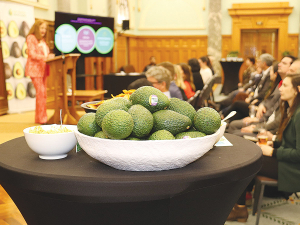Export delays, weather and global supply pressure hit NZ avocado growers
The avocado industry is facing an extremely challenging season with all parts of the supply chain, especially growers, being warned to prepare for any eventuality.
 NZ Avocados is forecasting that export volumes will be down over a million trays this season due to weather-related impacts on fruit quality.
NZ Avocados is forecasting that export volumes will be down over a million trays this season due to weather-related impacts on fruit quality.
Avocado growers are taking a major hit from weather-related impacts this season.
Grower body NZ Avocados is forecasting that export volumes will be down over a million trays this season due to weather-related impacts on fruit quality.
It has forecast volumes of around 4.4 million trays, with 1.4 million of those trays bound for export. However, things are looking better for next season.
NZ Avocados chief executive Brad Siebert says they are at the tail end of a challenging season where grower export pack-outs are down while operating costs are rising. He adds that increased competition in some key markets is also impacting export returns.
"NZ has had multiple seasons of terrible weather and this has contributed to significant volumes of fruit diverted to the local market, leading to lower overall returns," he told Rural News.
Commentin on the impact of lower volumes on grower earnings, he points out that it's more realistic to look at grower profitability than simple returns.
"The downgrading of fruit due to past wind events has of course created significant reductions in export volumes and this has been exacerbated by fruit age to market from unreliabile shipping schedules," Siebert explains.
"For an orchard business, the other half of the equation is expenditure on fuel, fertiliser, labour and supply chain costs that have been increasing exponentially."
He says the challenge ahead is to understand where efficiencies can be gained on orchard and through the supply chain whilst increasing demand.
Siebert says growers are looking forward to the 2024-25 season where fruit volumes are significantly up. "And if Mother Nature plays her part, we should be able to capitalise on these export opportunities and bring much needed value back to our growers."
Diverse Export Markets
New Zealand avocados are exported to over 30 countries, helped by our growers' relative pest free status.
This season the industry has exported to South Korea, Hong Kong, Taiwan, Thailand, China, Japan, India, Singapoere, Pacific Islands, UAE and Malaysia.
Australia remains a priority market but an oversupply there means that country's producers are also looking at export opportunities.
Siebert says Australia remains a priority market for NZ particularly at certain times of the season. "We also have positive news from the season relating to new market opportunities with Canada being serviced for the first time and we are back exporting to the US."
But the biggest development this season has been the local market becoming the biggest market.
Siebert says NZ Avocado needs to look after that.
"We do not import any avocados into the country, which means every avocado purchased in NZ is supporting local growers.
"We therefore need to increase consumption in New Zealand towards the per capita consumption rates that other countries like the US have achieved.
"That will come with a united sector delivering quality fruit to consumers who consistently purchase the world's most versatile and nutritious fruit."
Fonterra’s impending exit from the Australian dairy industry is a major event but the story doesn’t change too much for farmers.
Expect greater collaboration between Massey University’s school of Agriculture and Environment and Ireland’s leading agriculture university, the University College of Dublin (UCD), in the future.
A partnership between Torere Macadamias Ltd and the Riddet Institute aims to unlock value from macadamia nuts while growing the next generation of Māori agribusiness researchers.
A new partnership between Dairy Women’s Network (DWN) and NZAgbiz aims to make evidence-based calf rearing practices accessible to all farm teams.
Despite some trying circumstances recently, the cherry season looks set to emerge on top of things.
Changed logos on shirts otherwise it will be business as usual when Fonterra’s consumer and related businesses are expected to change hands next month.

OPINION: Here w go: the election date is set for November 7 and the politicians are out of the gate…
OPINION: ECan data was released a few days ago showing Canterbury farmers have made “giant strides on environmental performance”.